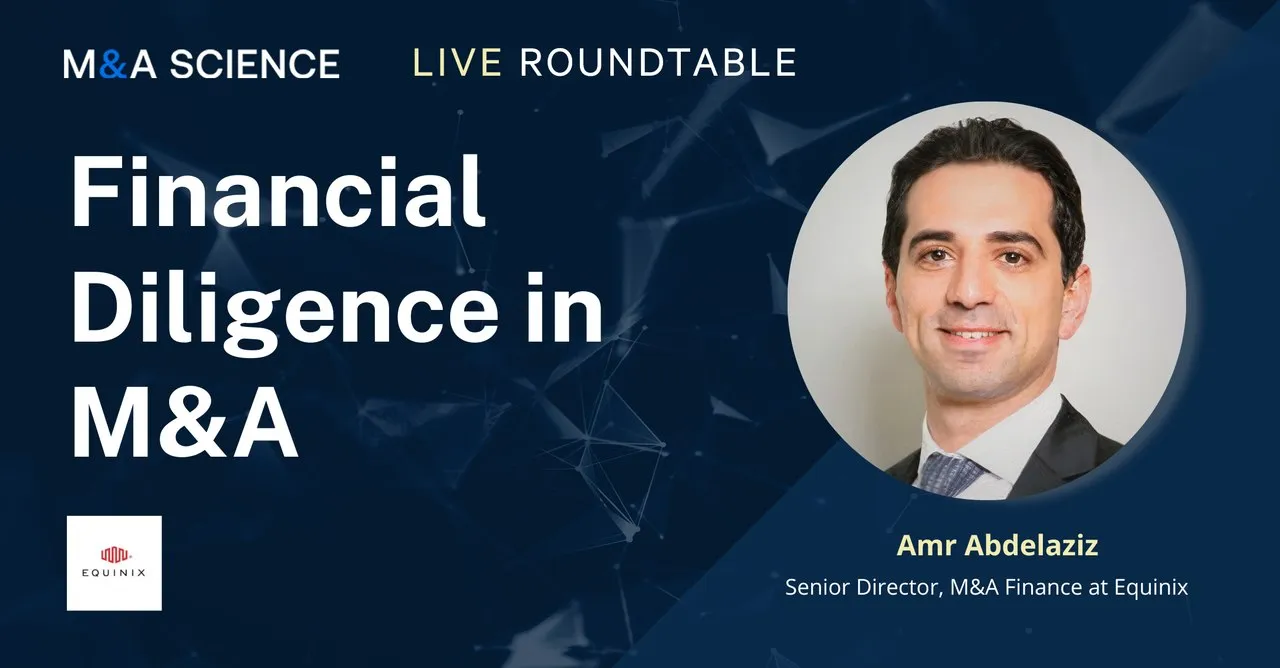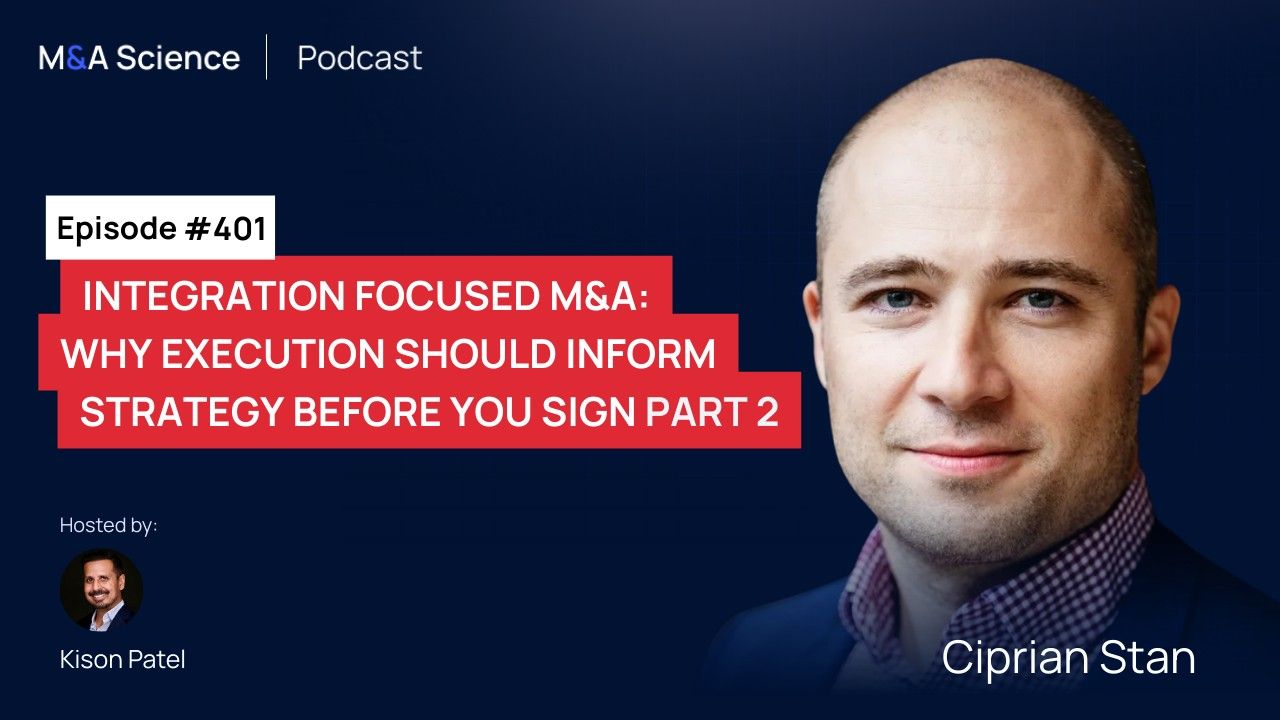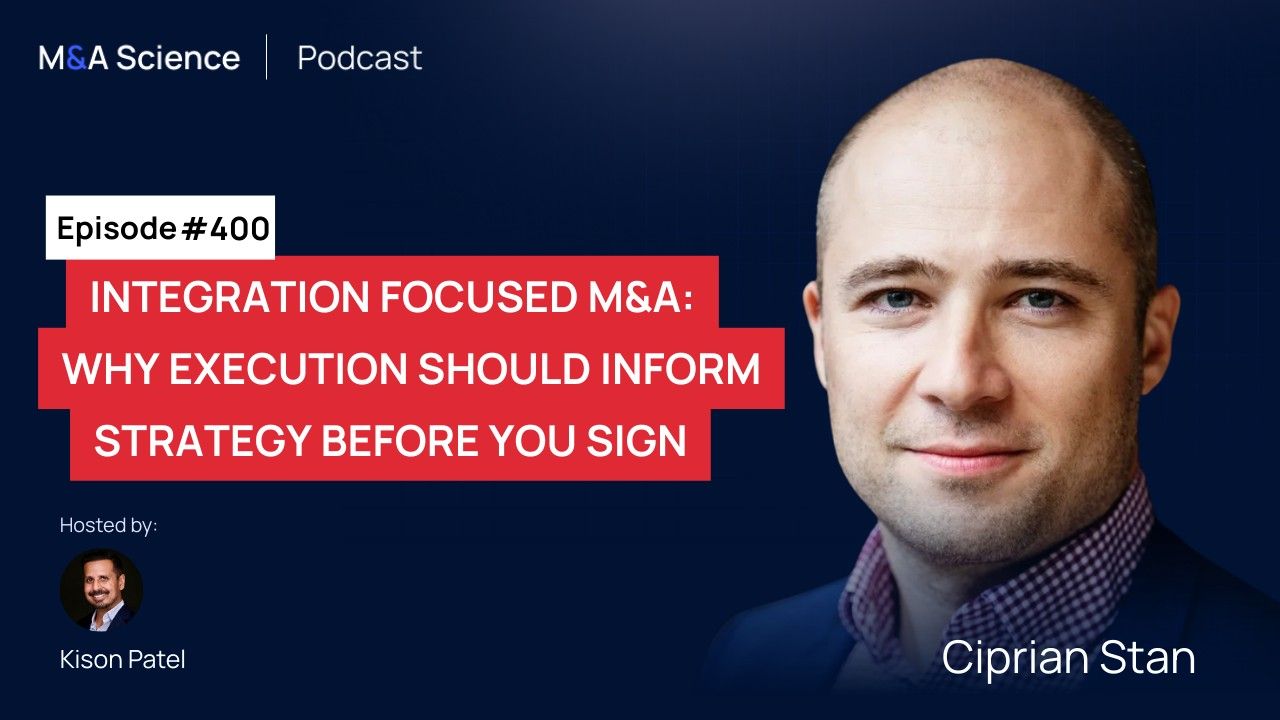
Amr Abdelaziz
Episode Transcript
The role of finance in M&A
The role of finance is huge, but if we zoom in into M&A finance, there are two pieces of valuation: a pre-sign and a post-sign.
Valuation Pre-sign is basically where we do financial due diligence. Where you are coming up with the value to negotiate with the seller. So this is one piece that as you unpack the diligence or the financial information, you come out with earnings, a number that is the basis for the valuation.
And then we start negotiation on this valuation based on the financial model on the DCF and the multiple of earnings.
We negotiate; we lead the finance negotiation side of the agreement. What you don't want to do is to unpack after close, after you close the deal, and then you are surprised with issues with liabilities.
When I was with PWC, there was a client actually had limited access to information. So the diligence was a little bit limited. And after closing, they were surprised with a huge tax liability of millions.
Valuation Post sign is managing the sign to close, the condition precedent until we close, helping controllership with the opening balance sheet, and doing the valuation. The purchase price allocation and dwelling of every asset we acquired.
You would record your goodwill and intangibles if you acquired a trademark, IP, real property, or personal property.
So after signing, we prep and do this as part of the accounting standards. We have to value every asset we acquire. So there are call it a different valuation to determine the price. The accounting post or at the time of close, we call it the opening balance sheet.
When does financing start
Typically it starts with our corp dev team. We have them in every region. So they understand the local market, scout for deals, and when they find a good deal, they call us to help unpack if it's a good deal for us or not. And at this point, we come and start our financial due diligence.
We always try to get involved in the deal early in the process. In other companies, you might see finance get involved late in the process, which creates a lot of issues because you unpack late in the process, it does not give room to negotiate because you are incurring costs.
So having M&A finance involved early in the process helps the company and helps the corp dev team. We start leading our financial due diligence and then we take the outcome of this financial due diligence to say, what we need to reduce the valuation or the purchase price.
Do we need to patch the risks through the sale and purchase agreement or should we not do this deal because we found a red flag and we should not pursue. So this is the pre-sign phase.
Steps of the Pre-sign Phase
We get really deep. Typically we issue a letter of intent or an expression of interest to the target, saying we are interested in buying this company with this valuation. If they accept our offer, then they send us a process letter.
This process letter includes what the steps are, it's typically prepared by the bankers and lays down the steps. When is the next bid due? The time, whether it's exclusive or not. And then, at this time, they provide us access to the virtual data room.
This data room includes everything about the deal. Sometimes we found 50% of what we need, sometimes 30%, sometimes 100%. We start to look at the first historical financial information, the income statement. It's accounting based. We convert this into what we call quality of earning.
Quality of earnings means that we transform this income statement into an economic earning or an economic statement where we try to clean it up from any non-recurring events, anything that is one-off to see what will be the continuing operations when we do the acquisition.
Examples of one-off, a fire happened or one-time revenue related to a specific project that would never happen. We tried to clean that up to see the normalized revenue and the normalized earnings. And based on that, this is the basic core of the purchase price, the valuation.
Building the internal QofE
Typically, we do that after the financial due diligence. And this is the purpose of the financial due diligence, we are saying, this is what the target is saying in their earnings. And we do the diligence and we say, No, actually, their earnings are not $10 million, it's 6 million. And if it's $6 million, you multiply it by a multiplier to get to the value and then we go through a negotiation.
It's a verification if the purchase price is true. That's why in the letter of intent, we say our offer is subject to financial due diligence and subject to what we're looking at in the earnings.
I've seen more than the sell-side prepare a QofE because if the sell-side prepares the QofE, at least they have done some work.
Does this mean that I rely on it? Not necessarily. I have to do my own financial due diligence and come up with my earnings, but it means that they reached out to the target, the advisor, whether it's PWC, KPMG, or others, and have done some prep work. That facilitates our diligence because they have done some work already.
We take what the consulting does, and we use this input to start a negotiation.
So we use the quality earnings of my advisor. I will hire a buy-side advisor like PWC, or KPMG and get the quality of earnings that they prepared and use this and go and negotiate on the other side with the target because we have to reach a middle ground. Because typically, our quality of earnings is different than their quality of earnings.
There's no standards around what the amount should be. And that's the tricky and the beauty of it, it's that negotiation art is to negotiate the deal based on these earnings.
QofE of the sell-side versus the buy-side
There's no standard that this is the right earnings. Because we are looking at the economic earnings, and it's not like US GAAP earnings. And hence we go back and forth in negotiation. And it depends on whether it's a buyer or seller market.
When it's a buyer market, we have the upper hand, we try to push it as much as we can to our quality of earnings versus if it's a seller market, then they have several bidders. So if they don't like our quality earnings, they will go to another bidder.
And actually, as part of that financial due diligence, we don't only look at the quality of earnings because the quality of earnings determines the purchase price.
However, we look as well at the quality of assets. What does it mean for quality of assets? We take the balance sheet and say, is the AR, accounts receivable is, collectible or not? Because you can acquire accounts receivable, but they'll be written off, and they're not collectible. There might be off-balance sheet commitments and liabilities.
So looking at all the liabilities and off-balance sheet commitments, sometimes there's a legal lawsuit that they did not record the liabilities on the ban sheet. So we look at that and if there is any additional debt or liability, it is deducted from the purchase price.
And this actually can be really material and a deduction to the purchase price. So it's not just a matter of earnings, but the deductions as well to the purchase price.
We try to have specific parameters in saying, if this deal is not accretive of after close, if one and two and three, then we will not pursue it unless there is a strategic, specific objective.
We want to enter into a specific market that we do not exist and our customers are asking us to be in this market. As a defensive move, we don't want our competitor too on this location because it's a strategic location.
So some other aspects of the deal that you have to look at are not only the financial diligence that you look at, the quality of earnings but other factors that we need to look at with business.
So we sit with corp dev, we sit with the business folks as well to see if this is the finance view on things, but we have to factor in the business view as well.
The Auction Process
It's not that the auction process has changed, it is the type of market. Is it like an up market or a down market? Who are the bankers? Some bankers will typically deal with the process in a specific process and some others not, but overall, if it's up market, you'll find a lot of pressure on the bidders.
There will be many bidders and there will be a lot of pressure on the timing. Rather than having three months to do the due diligence, it'll be just one month, maybe three weeks to do the due diligence and then submit an offer rather than working exclusively with a target. It'll be, you are working against other bidders.
You'll see the process typically change in an up market as well; typically, bankers will say it's a two-phase process. In the first phase, multiple bidders go against each other, and whoever bids higher after the financial due diligence will be selected for exclusivity for the second phase.
And this is the phase where you negotiate the agreements.
If it is in the down market, we see a one-on-one where it's just one phase. You have time, discuss with the target the terms and there is no pressure, and sign exclusivity. So you have much more time to go back and forth.
You have the upper hand, you know that this target is not looking around as well. So it gives us much more room. When we work on an up market, it's under pressure. So we are constantly under stress to complete the diligence as soon as possible sometimes with limited information.
Financial diligence tips for first-time acquirers
Typically, CEOs will be really business-oriented, which is typically a good thing. However, you have to look at other implications.
You don't want to do an acquisition and then unpack it afterward and realize it's not what you planned or in my mind.
Typically, we try as much as possible to inform other teams, including our exec team and our CEO, about the issues we might find and that we need time to do proper due diligence. We need time to unpack everything so that we're not surprised.
If we're talking about startups, sometimes when they do an acquisition, they make small acquisitions, the startup founders, they want to do an acquisition as an acquihire, etc. And they don't think about the financial implications and are typically surprised.
But as this founder grows to become like a CEO of a public company, you realize that you need time and you need to involve, you need to have a collaboration between different teams, like the HR, legal, corp dev, and even risk, and compliance, tax, integration team. All of us need to collaborate, and it takes time.
Numbers do lie. Make sure you do your proper due diligence. - Kison Patel
The number might look pretty, but when you dig deeper sometimes or half the time, you might see adjustments. Occasionally, we find issues that even the target did not know about. If they're not financially savvy they do not realize they have this issue, and sometimes they don't have a financial advisor. And hence we find things that are not reconciling or issues they are not aware of. We work together to ensure that whether we reduce the price or this issue is addressed in the purchase agreement.
Steps of the Financial Diligence
Technical diligence
If you're acquiring a tech company, typically, it'll start with technical diligence. If you're doing an acquihire, you'll assess your employees and retention. So it depends on the industry and the type of company. If we're acquiring a software company, it's different than acquiring an operating data center company.
In a tech company, you'll start with the tech diligence, and the ops team will do their research and make sure this is the right target. And then the financial due diligence might come secondary if it's a pre-revenue startup or if it's just a small revenue.
So this is one thing that differs from one transaction to the other. Your starting point would be your historical information if it's an operating data center operating center.
Financial information
The second step is looking at the projected financial information, which is important. We typically see the sales side sending us their projections, and you see this hockey stick as if you know acquisition will happen. Everything will be super good, and they will grow like 200% year over year.
We typically prepare our projections. We have a team, a modeling team, that prepares our forecasts, but we reach out to the target to understand their assumptions.
Maybe we can use some assumptions they have used, but we question the assumptions that they have used in their model. It's not only about history. History can indicate, but how are you planning to expand? Which production lines are you planning to look at or invest? Which markets do you want to expand into? Is this deal accretive to your earnings or not?
Because you'll go into guidance in the earning call and you would be questioned about whether you meet expectations, analyst expectations or not if you do an accretive deal that will increase your earnings.
Valuation is always an art. It's how you just defy your assumption that is what's important. - Amr Abdelaziz
The Relationship Component
If we find issues, if we can communicate as early as possible with the target and have an open discussion, this is the best course. So having this line of communication going between the seller and the buyer is key, and there are different levels of communication.
So the CEOs of the two companies typically should not get involved until late in the process when everything is done. The other teams like the advisors should talk to each other. And if we don't come up with a resolution, we can find a middle ground.
Sometimes in negotiation, we have an issues list. We tell them that we found this issue, but we park all the issues and then have an issue list discussion, and we go through the issues list.
And this is typically in a very interesting meeting or negotiation where we concede on two or three, and they will concede on two or three. Because typically, there is like bucket of issues. Depending on the interest from the buyer and seller's interest and the substance of the issue, you might concede on some and not on others.
Negotiations
Quality of earnings
The number one is the earnings; whether it's your quality earnings or my quality earnings. And this includes a lot of adjustments in between. So we go through each one of them.
Debt
Is this a debt or not? Is off-balance sheet commitment should be deducted from the purchase price or not? So we go through the deductions.
Added Protection
Things that we are not sure will happen after close, like taxes. What if there is a tax claim after close? We try to put like an escrow to increase the escrow. What does escrow mean? It's carve out. If we are acquiring $1B, we try to carve out, for example, a hundred million to be paid after two years as a protection for us.
So it's held with the bank until everything concerning taxes. Sometimes it's specific to some items, sometimes, it's general escrow. So escrow amount, sometimes if we go back and forth whether we want to carve out like significant amount, they will say, no, it's only 10% or 5% of the deal.
Sometimes they say no escrow. So then we look for protection through reps and warranties or presentation and warranties to ensure that we are covered. We try as much as possible to increase the reps and warranties so that we are not surprised.
Because even if you've done detailed due diligence, you cannot do everything; you cannot cover a hundred percent of everything. So reps and warranties, escrow, and indemnities will cover any additional risk we are unaware of.
Collaboration with other teams
We interact with legal, HR, and corporate development, tax, integration team, risk and compliance, and all of the teams we work with, and we collaborate. We have a weekly deal team meeting where every one of us we have a representative, and we discuss everything in the deal.
Legal team
We are really close to the legal team and the corp dev team. The legal team helps us address and patch any risk in the agreement. So we think together about how we can manage the risk. Sometimes we debate back and forth. But we always agree at the end of the day.
HR
HR typically they do their due diligence, which depends on the type of deal. If the deal we're doing is an acquihire, we're just acquiring the employees.
There are a lot of things that HR thinks about depending on the type of deal, but from our finance side, we have a line of communication with HR to understand any liability that we should expect after the close.
Anything that will lead to an obligation post-close will have to be recorded on the balance sheet. Some folks will have a massive accrued vacation or bonus that should be paid by the seller rather than the buyer.
So we work closely to interpret what they found and see if there is any implication on the liability because this would be a deduction on the purchase price. So everything is linked back to the purchase price and the agreement.
Treasury
We work with the treasury especially if we're doing an acquisition, for example, we think through the currency, how are we sourcing the currency?
How are we planning to finance the deal? Is this through debt, equity, and a mix of debt and equity? Do we need to raise capital for that or not? Do we need to prepare a proforma balance sheet for them to talk to the bankers and get debt financing? They are the one who has the cash to pay.
So if we're not working with them closely from the beginning to plan the deal, they'll say we don't have cash for you. We try to get the best price for this target and address the risks in the agreement or through escrow.
Post close
As part of the close, the technical accounting team will prepare the opening balance sheet and in part of it, they will ask us to prepare a valuation for what we acquired.
- What's the value of intangibles?
- What is the value of goodwill?
- What's the value of the trade name, and the customer relationships?
So our team prepares the valuation or the purchase price allocation recorded in the books on day one. And then it'll go through that audit from the auditor. And if they have any questions, we address those questions, and then we go golfing.
Impairments
When you make an acquisition, you record the assets and do a purchase price allocation. You say, this is the goodwill; this is intangible. And then the SEC codification or the US GAAP accounting codification every quarter, you have to assess your assets for impairment.
After that acquisition, you have to look at your intangible, goodwill, real property, and personal product and say, do I need to impair any of the assets?
And this can be on a two-step process or one step doing qualitative and quantitative analysis. So you start with a qualitative and say, is there anything that led me to believe that I should impair this asset or not?
And then you go through the process of accounting codification until you say this needs to be impaired or not.
If you value based on the growth and based on specific churn rate and now the growth is decelerating. 'Do I need to impair this intangible or not?' A lawsuit happened on the trade name, you think about it should I discount or impair this trading value on the balance sheet or not? So you have to ask yourself these questions.
- What happened to the company itself?
- What happened to the economy?
- What happened to the industry?
- It's more of qualitative and then you go deeper into quantitative.
- How about the gross margins?
- Is this production line dying?
It's not a choice. You have to follow the accounting qualification; otherwise, your financial statements will be materially misstated. If it is a significant impairment and you did not impair it, you'll get a material misstatement, and your stock price will go down.
This is definitely not a choice. From a tax perspective, I will leave it to the tax guys whether there is a tax benefit, but I don't think we should look at it whether it's beneficial or not; it's more about whether we have to follow the SEC rules regardless.
M&A Software for optimizing the M&A lifecycle- pipeline to diligence to integration
Explore dealroom

Want to wear your M&A expertise?
Check out the M&A Science store.




.jpeg)
